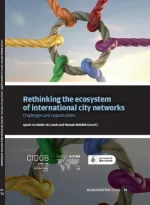Cities, citizens and demodiversity: an overview of two generations of city networks

International municipalism is not a new phenomenon, but its recognition remains an ongoing process. During the last decades, increased urbanisation rates (up to 50% in 2007: see UCLG, 2016), the rearrangement of decentralisation frameworks in many countries and the new role of local authorities as engines and guarantors of local development have established cities as important political protagonists.
The beginning of the new millennium was characterised by two diverging but complementary trends. On the one hand, networks advocating for the recognition of cities as pivotal political and diplomatic actors tended to merge to strengthen their position vis-à-vis states and the United Nations. On the other, new thematic networks fostering peerto-peer learning, pilot experiments and knowledge exchange started to grow and multiply at both national and international levels.